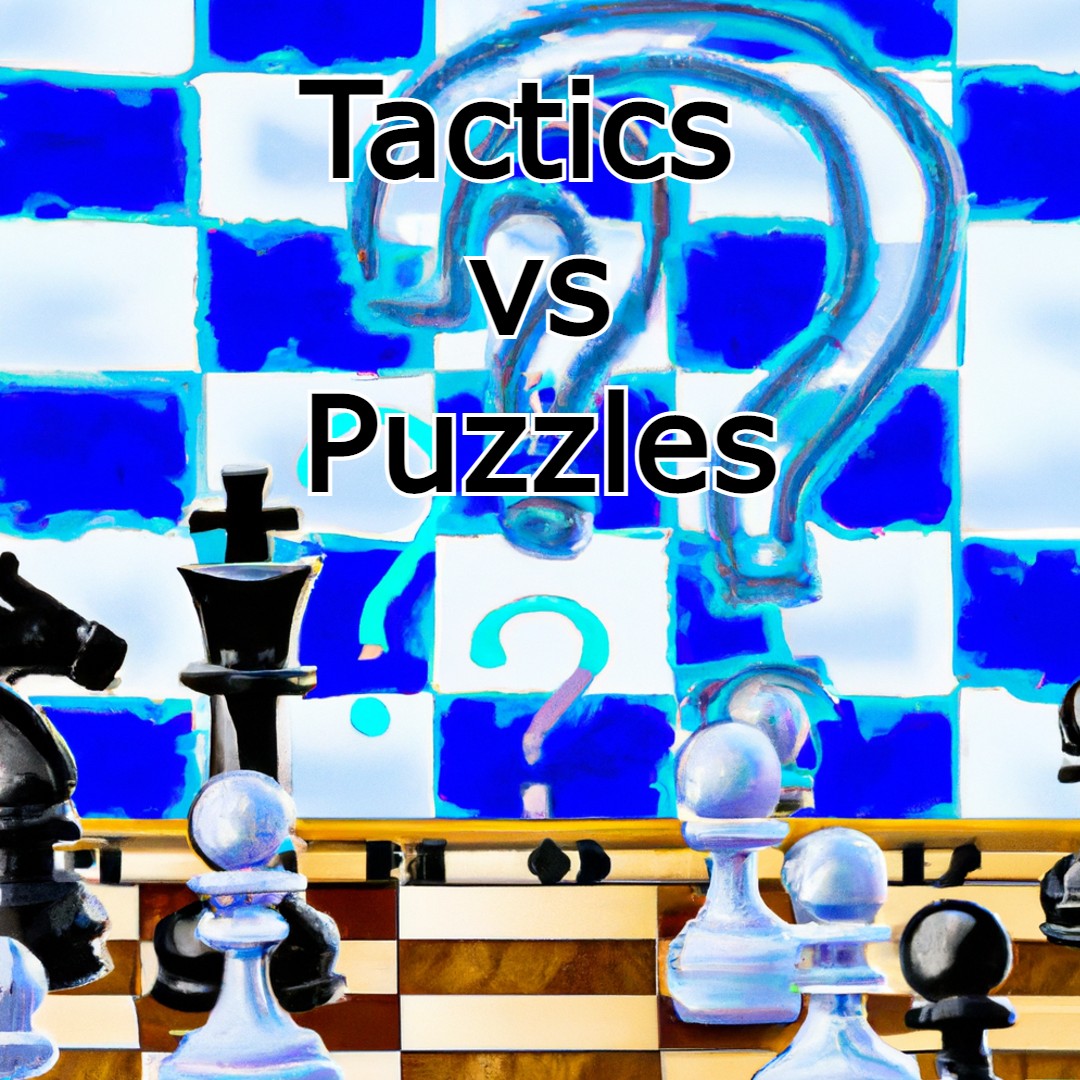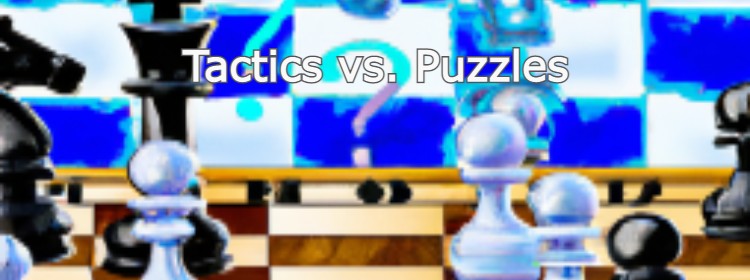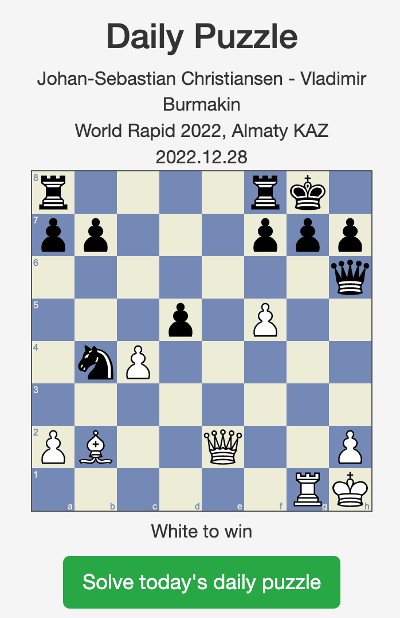Chess tactics are an essential part of the game of chess and are often the key to winning a game. Without a good understanding of tactics, it is difficult to succeed at chess. There are several reasons why learning chess tactics is important for every chess player.
Learning chess tactics allows you to search for specific patterns and motifs, study the games of strong players, create your own training positions, and practice your tactics with puzzles. OpeningMaster is happy to announce that we are joining forces with famous ChessPuzzle.net to bring you great chess puzzles using our OpeningMaster chess databases.
Top reasons why chess tactics are critical
There are several reasons why chess tactics are important for chess players:
Tactics are an essential part of chess and are often the key to winning a game. Without a good understanding of tactics, it is difficult to succeed at chess.
Tactics help you find the best moves in a given position. By practicing tactics, you can improve your ability to find strong moves quickly and accurately.
Tactics training helps you develop your chess intuition and pattern recognition skills.
Tactics can help you create imbalances in the position, which can lead to long-term advantages.
Tactics can also help you defend against your opponent's threats and can give you the opportunity to turn the tables on your opponent.
Overall, chess tactics are an important aspect of chess that can help you to improve your game and become a stronger chess player.
Learning Chess Tactics
Tactics are an essential part of chess and are often the key to winning a game. When you understand chess tactics, you can find the best moves in a given position and can create imbalances in the position that lead to long-term advantages. Without a good understanding of tactics, it is difficult to succeed at chess.
Second, tactics training helps you develop your chess intuition and pattern recognition skills. When you practice tactics, you are exposed to a wide range of positions and are forced to find the best moves quickly. This helps you develop your ability to recognize patterns and to find strong moves instinctively.
Third, tactics can help you defend against your opponent's threats and can give you the opportunity to turn the tables on your opponent. When you understand tactics, you can identify when your opponent is setting up a tactic and can find a way to counter it. This can be especially important in positions where you are under pressure and need to find a way to defend yourself.
Fourth, tactics training can help you to improve your calculation skills. When you practice tactics, you are forced to consider several moves ahead and to evaluate the potential consequences of each move. This can help you to improve your ability to calculate and to make more accurate predictions about the likely outcome of a position.

Finally, tactics training can help you to improve your overall chess skills. When you practice tactics, you are exposed to a wide range of positions and are forced to find the best moves quickly. This helps you to develop your chess intuition and pattern recognition skills, and can also help you to improve your calculation skills. As a result, learning chess tactics can help you to become a stronger chess player overall.
Learning chess tactics is important for every chess player because it is an essential part of the game, helps you develop your chess intuition and pattern recognition skills, can help you defend against your opponent's threats, can improve your calculation skills, and can help you to become a stronger chess player overall. Whether you are a beginner or an experienced chess player, learning chess tactics is an important step in your chess journey.
How can a good chess database help learn chess tactics?
A good chess database can be a valuable tool for learning chess tactics in several ways:
A chess database allows you to search for specific tactical patterns or motifs. For example, you can search for all the games in the database where a knight forks the king and queen, or where a bishop pins a knight. This can help you to see how these patterns have been used in real games and can give you ideas for how to use them in your own games.
Do you want to practice tactics and create your own puzzles or just replay the games of all tournaments? Just download our biggest over the board chess database in the world with 9.5 million human chess games.
A chess database allows you to study the games of strong players and see how they handle tactical positions. By studying the games of grandmasters, you can learn how they find strong moves and can get a sense of how they think about tactical positions.
You can also create training positions and puzzles. Using a good chess database to find positions that illustrate a particular tactical theme is fun activity. Use those positions to practice your tactics.
With chess database training software chess player can generate tactics puzzles for others to solve. These puzzles can be customized to your skill level and can be a good way to practice your tactics.
Overall, a good chess database can be a valuable tool for learning chess tactics because it allows you to search for specific patterns and motifs, study the games of strong players, create your own training positions, and practice your tactics with puzzles.
Solving puzzles with ChessPuzzle.net
Solving chess puzzles can definitely help a chess player to become a better tactical player. When you solve chess puzzles, you are presented with a specific position and are asked to find the best move. This requires you to analyze the position and to consider the potential consequences of each move. As you solve more and more puzzles, you will improve your ability to find strong moves quickly and accurately, and your tactical skills will improve as a result.
Using Opening Master chess database has never been more fun.
In addition, solving chess puzzles can also help you to develop your chess intuition and pattern recognition skills. When you are presented with a puzzle, you are exposed to a wide range of positions and are forced to find the best moves quickly. This helps you to recognize common tactical patterns and to find strong moves instinctively.
Did you know that solving chess puzzles can also help you to improve your calculation skills? When you are trying to solve a puzzle, you may have to consider several moves ahead and to evaluate the potential consequences of each move. This can help you to improve your ability to calculate and to make more accurate predictions about the likely outcome of a position.
Solving chess puzzles is an excellent way to improve your tactical skills and can help you to become a stronger chess player.
Magnus Carlsen, the World Chess Champion, has said that solving chess puzzles is an important part of his training routine. He believes that solving chess puzzles helps to improve his calculation skills, pattern recognition, and overall understanding of the game. In an interview, Carlsen said, "I solve chess puzzles every day. It's an important part of my training routine. I try to do at least 50 tactical positions a day. It helps me to improve my calculation skills, pattern recognition, and overall understanding of the game."
Visit and subscribe to our YouTube channel  to learn chess openings and much more.
to learn chess openings and much more.






